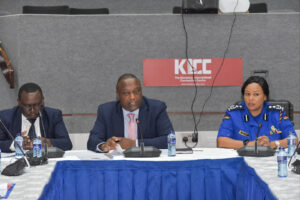The coalition of food and land use stakeholders (FOLU) has come together to address the urgent challenges of food and nutrition insecurity, land degradation, growing inequalities, and declining agricultural output in Kenya.
FOLU yesterday held a high-stakes meeting, spearheaded by AGRA, the World Resources Institute (WRI), the Global Alliance for Improved Nutrition (GAIN), and the United Nations Sustainable Development Solutions Network (UNSDSN).
The event brought together key figures representing various sectors, including government, county government, private industry, development partners, farmer organizations, and civil society groups.
The meeting was organized to explore collaborative strategies aimed at achieving the United Nations Sustainable Development Goals (SDGs) and adapting food systems and land use practices to combat the impacts of a changing climate.
Cecil Haverkamp, Director of UNSDSN, acknowledged the primacy of governments and the key role they play in steering local solutions for sustainable development.
He recognized the critical role of government in developing policies and how the private sector and NGOs should consider existing policies that are available when seeking to execute projects and programs relating to food security.
Cecil also deeply delves into target-driven development – with short-, medium-term, and long-term targets, policies, and action. ”The way to approach development is to set national goals that are supported by policies with enough resources and capacity to implement the programs,” said Cecil
Speaking about the complexity of food systems and land use reform and adaptation, Cecil highlighted the need for collaboration and public sector inclusion. ‘It is important to engage the policy implementors when drafting policies and for the private sector and NGOs to include governments at the front and center of projects.’ Said Cecil.
Dr. Kalibala, the President of AGRA, also emphasized this point. She acknowledged that NGOs are now the ones who hold and manage resources, as well as the ones who have skilled task forces and personnel, while the governments face inadequate capacity and resources to implement their policies.
Dr. Kalibata brought out that NGOs sometimes disregard government initiatives in a patronizing way and try to be the ones who come up with mechanisms and policies. The corrupt perceptions that the private sector and NGOs have toward governments hinder effective resource mobilization for public initiatives that support sustainable food systems.
Central to the discussions during the event was the pivotal link between food systems and the policies that support the agenda.
Dr. Kalibata, stressed the imperative need to invest in our food systems, identifying areas where we can add value and create opportunities within various food systems across different countries.
She also highlighted the pressing nature of the challenges we face, underscoring that urgency and innovation are now more critical than ever. ‘’We need to think beyond bilateral aid and look into debt swap and donor partitioning.
And it’s also important for donors to align their efforts from a myriad of initiatives to a narrow scope where they can be able to show significant progress and milestones.’’ said Dr. Kalibata.
Dr. Kalibata said in her closing remarks that we also need to see how resources can be transformative and combine private sector efforts with government efforts, especially devolved units, to build sustainable food systems. “Aid is not a miracle worker, and we need to empower institutions to develop a critical mass of resources in order to move forward and unlock the potential of African countries,” she said.
The discussions hinted at the roles of FOLU as a supporter of governments in making a case internationally, by vouching for the quality of existing policies and their commitment to implementing them, and by making a real effort to unlock funds.‘UNSDSN is working to determine what countries have committed to, what existing policies are in place, and how FOLU can support countries in implementing those commitments and policies.’ said Cecil. Cecil also underscored FOLU’s unwavering commitment to the Sustainable Development Goals (SDGs) agenda and policies.
The FOLU coalition reaffirmed its unwavering commitment to supporting food systems, exemplifying the essence of collaboration and collective action. It acknowledges the paramount importance of addressing the multifaceted challenges embedded in today’s food systems and land use practices. The coalition also emphasizes the need to align its strategies with climate adaptation and nature restoration.
Furthermore, the event delved into the intricate dynamics of food and land use and the compelling need to prioritize youth empowerment, foster social inclusivity, and enhance nutrition.
Today’s event marked a significant milestone in AGRA’s ongoing collaboration with FOLU, emphasizing their commitment to supporting the transformation of food systems. The partners at FOLU aspire to support food systems and adapt our approach to land use, ultimately ensuring a healthier planet for generations to come. As a core partner, AGRA reaffirmed its dedication to advancing sustainable food system transformation and ensuring food security throughout the African continent.
About AGRA:
Founded in 2006, AGRA is an African-led African-based organization dedicated to catalyzing Agriculture Transformation in Africa. AGRA focuses on placing smallholder farmers at the heart of the continent’s growing economy by transforming agriculture from a solitary struggle to survive into a thriving business. As the sector employs the majority of Africa’s population, nearly all of whom are small-scale farmers, AGRA recognizes that developing smallholder agriculture into a productive, efficient, and sustainable system is essential to ensuring food security, lifting millions out of poverty, and promoting equitable growth across the continent.
About FOLU.
The Food and Land Use Coalition (FOLU) is a community of organizations and individuals committed to the urgent need to transform the way we produce and consume food and use our land for people, nature, and climate.
They support science-based solutions and help build a shared understanding of the challenges and opportunities to unlock collective, ambitious action.










